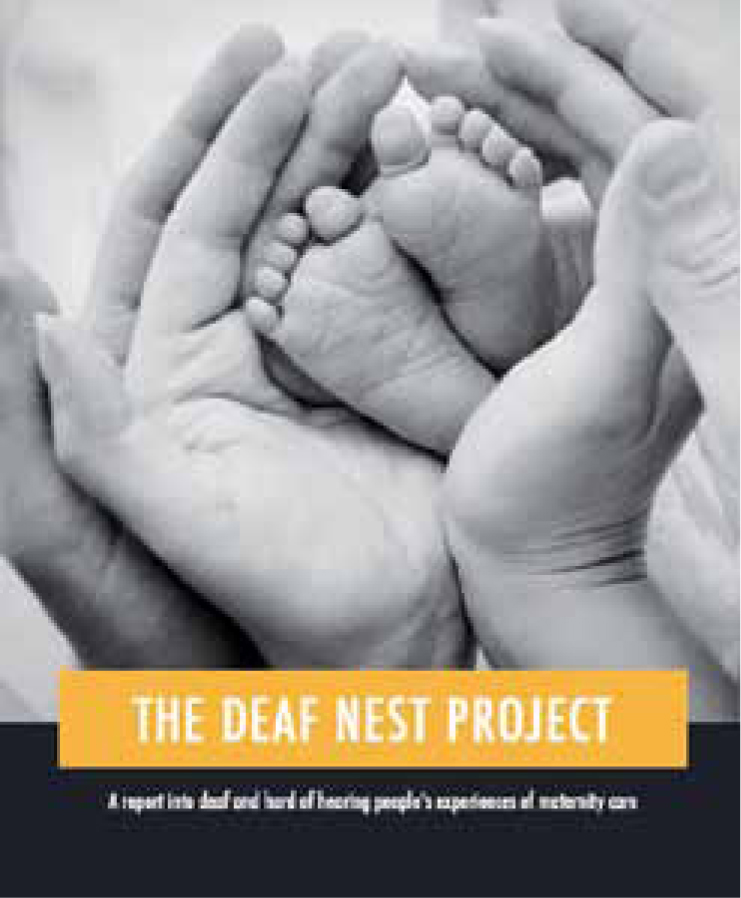
The report produced by the Deaf Nest Project highlights the contribution midwives can make to achieving quality maternity services for Deaf women and their families. It focuses on the barriers Deaf parents experience when accessing maternity services and how midwives, managers, members of the maternity team, educationalists, commissioners and service users can work together to provide the best possible care for these women and their families.
In June 2013, the Deaf Nest Project in partnership with the Deaf Health Champions and the Manchester Deaf Centre set up a consultation group for Deaf parents to make sure their voice is heard. This involved listening to Deaf parents’ experience of pregnancy and childbirth and involving them to bring about change. The author of the report met with two national charities—the Sign Health and the Deaf Health Champions. While both of these organisations are working towards improving access to health care, there is lack of information and services specific to pregnancy and childbirth. We discovered that Deaf parents have been left frightened by limited information, no communication provision and a general lack of understanding about the culture of Deaf people. Deaf women received less information regarding parenting issues and had less social interaction with other mothers. It was difficult for mothers to access hospital or a midwife for help unless a mobile number was given. Other issues included fear and anxiety of being judged by health professionals regarding caring for a baby.
A lack of communication support was also highlighted in the most recent study of understanding Deaf young people's sexual and reproductive health needs, produced by the British Pregnancy Advisory Service and the Deafax (BPAS and Deafax, 2014). One third (34%) of the women surveyed had been pregnant. The experience of this group of women mirrors that of Deaf people accessing health care services in general, with almost half stating they did not understand all the information at medical appointments as no communication professionals were provided. While for those women who received adequate support, pregnancy and birth were positive experiences, the majority did encounter substantial difficulties when accessing maternity services. Many women were unable to attend antenatal classes, which can provide a valuable social network for new mothers as well as advice and information (BPAS and Deafax, 2014).
What is now clear is that maternity services need to change. As a result we set the objective to develop policy and programmes for the public health role of the midwife in providing care to Deaf parents. We will continue to actively engage across voluntary sectors in order to develop accessible evidence, based on NICE guidance and putting it into practice. Deaf parents have to be able to access maternity services on an equal footing with hearing parents.
You can help as well. We want to ensure deaf awareness and basic sign language training for front-line maternity staff and implement simple measures to ensure that communication needs are met. To achieve this, we call on midwives and maternity workers to become Deaf Nest Champions. So we can ensure that all maternity units have at least one ‘front-line’ member of staff who has been formally trained in deaf awareness. Moreover, we need passionate volunteers and influential supporters, across a wide range of industries and regional areas that help forge fundraising relationships and raise awareness of deafness, and who can be the face of the project in their communities across England. If this is you and you are looking for an exciting role within the voluntary sector, please see more details on our website (deafnest.com).
The NHS needs to make reasonable adjustments to ensure their services are fully accessible to Deaf and hard of hearing parents and their families. We need to see urgent action to improve the delivery of maternity services for these people. By improving communication and developing more inclusive services for Deaf and pregnant women, women and their families will be empowered and more confident in accessing midwives and health professionals. This will in turn result in women having a positive birth experience as well as healthier and better outcomes.

For more information download your free report on www.deafnest.com.

